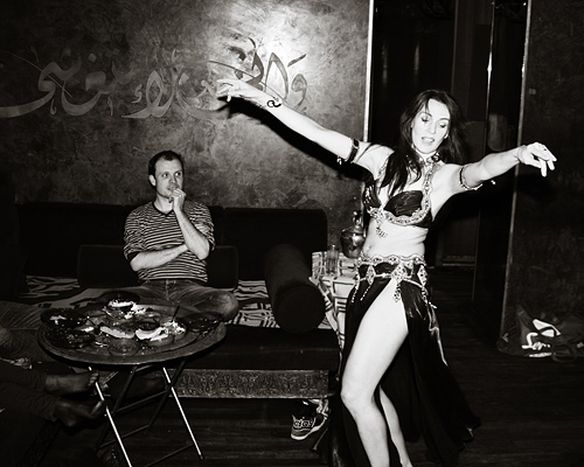
Nomads: The Bedouin restaurant in Amsterdam
Published on
In a city where everything happens in plain view, finding a well-preserved culinary gem, hidden and untarnished by the dollar toting masses, can be quite a challenge. But if you approach the task with a certain rigour and scout around the elegant canals, you will soon discover that Amsterdam, the city of dimmed lights and drapeless windows, has more to offer than meets the eye.
A stroll in the capital of the Netherlands can be equally pleasing and exhausting. If you fancy a delightful dinner while lounging on a cushiony divan, there is one place that can fulfil all your wishes. On the busy Rozengracht street (which literally means the Canal of Roses), just a few blocks from Anne Frank’s house, I found the stairways that lead to Nomads, a restaurant with an Arabic vibe. There is no visible sign, yet somehow locals and certain tourists alike, seem to instinctively sense its whereabouts.
Exotic Ambiance Straight From the Levant’s Legends
Faster than you can say ‘open sesame’, the solid copper door slides open. And there I am in the richly decorated, cosy artrium of what seems to be an Arabian house. It evokes the tales of Sheherazade. The entrance is modelled after a Bahou, the room where Arabs receive their guests without disturbing the other residents. I am welcomed by a smiling hostess, who accompanies me to my table. In fact, as I’m about to find out, there is no table at all. Bedouins eat from big trays on the floor.
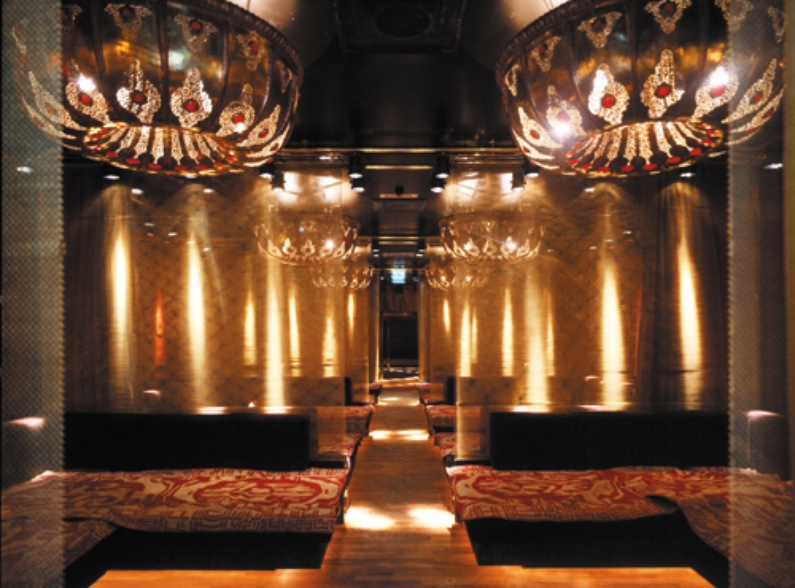 I follow my hostess through the Al Kubbah, an intimate area with six niches, each furbished with lavish settees. The ambiance is overwhelming yet nonchalant; a dichotomy that adds an extra notch of mysticism to the place. On each side of the room there are opulent red mirrors on the walls. Nomads’ owners take great pride in the fact that all the furnishings are especially designed for this venue and handmade in Morocco and Egypt.
I follow my hostess through the Al Kubbah, an intimate area with six niches, each furbished with lavish settees. The ambiance is overwhelming yet nonchalant; a dichotomy that adds an extra notch of mysticism to the place. On each side of the room there are opulent red mirrors on the walls. Nomads’ owners take great pride in the fact that all the furnishings are especially designed for this venue and handmade in Morocco and Egypt.
Finally, I enter the main room, a large rectangular area with a golden canopy in the middle, and long, soft settees adorning each side. It is modelled after a Wast ad-der, the heart and social hub of Arabian homes.
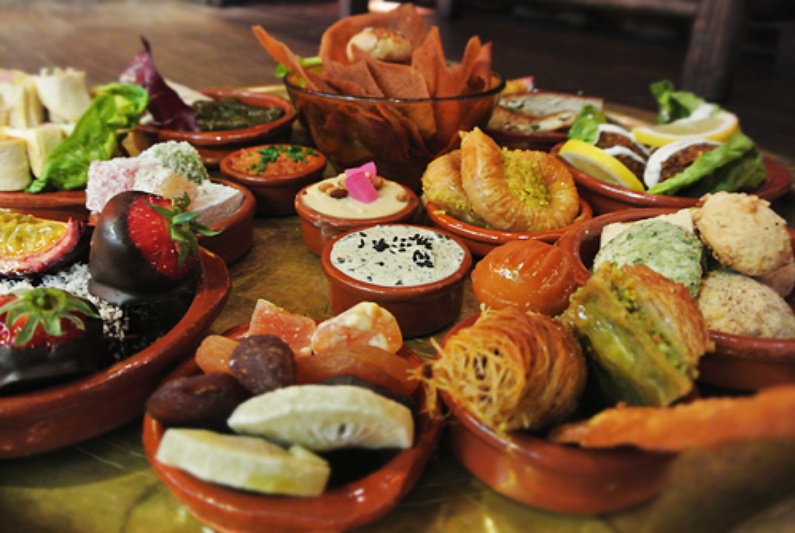 ‘There is a big demand for Arabian style dishes in combination with a more high-end restaurant atmosphere,’ says Jade Lew, the PR & marketing manager. ‘We do love the way Arabic people share their food, how relaxing it is,’ she explains. According to Jade, there is a big Arab community in Amsterdam and at the time Nomads opened, some 12 years ago, such restaurants were few and far between.
‘There is a big demand for Arabian style dishes in combination with a more high-end restaurant atmosphere,’ says Jade Lew, the PR & marketing manager. ‘We do love the way Arabic people share their food, how relaxing it is,’ she explains. According to Jade, there is a big Arab community in Amsterdam and at the time Nomads opened, some 12 years ago, such restaurants were few and far between.
Mezze on Profane Rhythms
As I lounge on the cosy cushions under the canopy, I realize that I have developed quite an appetite. I browse the menu avidly, hoping that the dishes do justice to the delightful décor. I also keep my fingers crossed that the meal won’t hit me in the pocket too brutally.
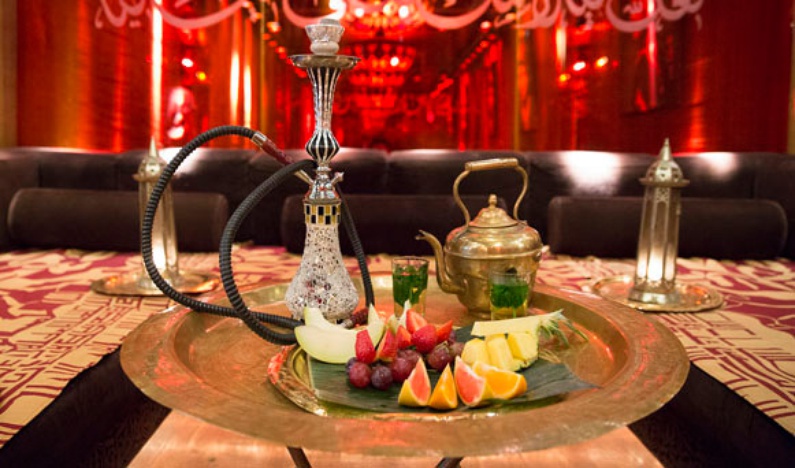 I opted for the ‘Nomad menu’, which consists of three courses: one combination of cold mezzes, another of warm mezzes and a dessert. Mezzes are small Arabian dishes, which together make up a meal. According to Jade, the menu meets all halal requirements. Only the freshest products and ingredients are used and there is no pork on offer. Personally I don’t miss it too much anyway.
I opted for the ‘Nomad menu’, which consists of three courses: one combination of cold mezzes, another of warm mezzes and a dessert. Mezzes are small Arabian dishes, which together make up a meal. According to Jade, the menu meets all halal requirements. Only the freshest products and ingredients are used and there is no pork on offer. Personally I don’t miss it too much anyway.
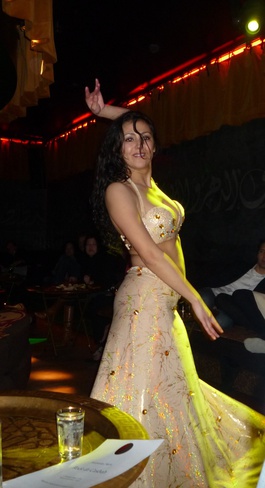 I’m working my way through a mouth-watering started which combines humus, couscous salad, eggplant dip, pumpkin spread, and spicy peppers filled with goat cheese. The hot mezzes include veal tajine with prunes, truffle tapenade with almonds, creamy mint sauce, caramelized cheese and grilled chicken with pumpkin chutney. Just to mention a few! The chef is generous with spices such as parsley, thyme, coriander, chermoula and tarragon, and as such every bite is followed by a powerful, exquisite aftertaste. The mezzes are served on huge round copper trays together with warm Lebanese /Iraqi bread. The dessert consists of fruit salad and baklavas. The price, without drinks, was just over 40 Euros, which is not outrageous by Amsterdam standards.
I’m working my way through a mouth-watering started which combines humus, couscous salad, eggplant dip, pumpkin spread, and spicy peppers filled with goat cheese. The hot mezzes include veal tajine with prunes, truffle tapenade with almonds, creamy mint sauce, caramelized cheese and grilled chicken with pumpkin chutney. Just to mention a few! The chef is generous with spices such as parsley, thyme, coriander, chermoula and tarragon, and as such every bite is followed by a powerful, exquisite aftertaste. The mezzes are served on huge round copper trays together with warm Lebanese /Iraqi bread. The dessert consists of fruit salad and baklavas. The price, without drinks, was just over 40 Euros, which is not outrageous by Amsterdam standards.
 But the feast doesn’t ended there. As the evening grows longer, a DJ takes music matters into his hands, an eclectic mixture of exotic sounds with a Far East ambience. A professional belly dancer makes quite an appearance with her undulating moves, drawing loud acclamations from the eager public. ‘In reality this is not what you get in a Bedouin tent in the Arabian Desert; it seems more like it’s been taken straight from the fantasy tales of 1001 Nights,’ whispers my companion, Ronald. He happens to be an anthropologist who specialises in the cultures of the Middle East. ‘A beautiful fantasy, nevertheless,’ he adds, inhaling deeply from the apple-flavoured shisha pipe, not taking his eyes off the belly dancer’s luscious hips for even a moment.
But the feast doesn’t ended there. As the evening grows longer, a DJ takes music matters into his hands, an eclectic mixture of exotic sounds with a Far East ambience. A professional belly dancer makes quite an appearance with her undulating moves, drawing loud acclamations from the eager public. ‘In reality this is not what you get in a Bedouin tent in the Arabian Desert; it seems more like it’s been taken straight from the fantasy tales of 1001 Nights,’ whispers my companion, Ronald. He happens to be an anthropologist who specialises in the cultures of the Middle East. ‘A beautiful fantasy, nevertheless,’ he adds, inhaling deeply from the apple-flavoured shisha pipe, not taking his eyes off the belly dancer’s luscious hips for even a moment.
East mirrors West
In the opposite end of continental Europe, boasting an amazing view over the Bosporus, there is another Nomads restaurant in the beautiful city of Istanbul. It looks like Nomads is becoming a successful franchise and hopefully more European cities will have the chance to enjoy this unique restaurant concept in the future.



